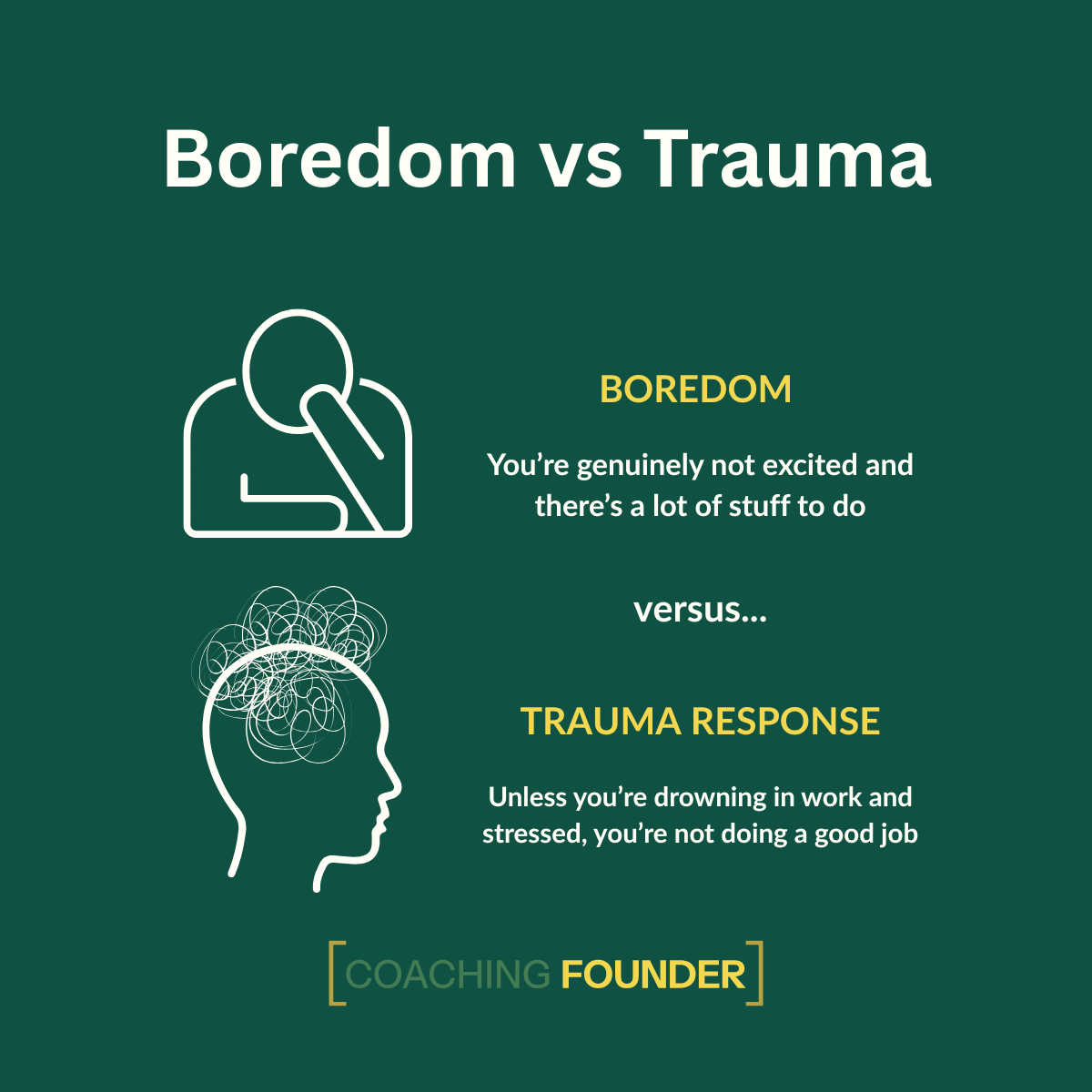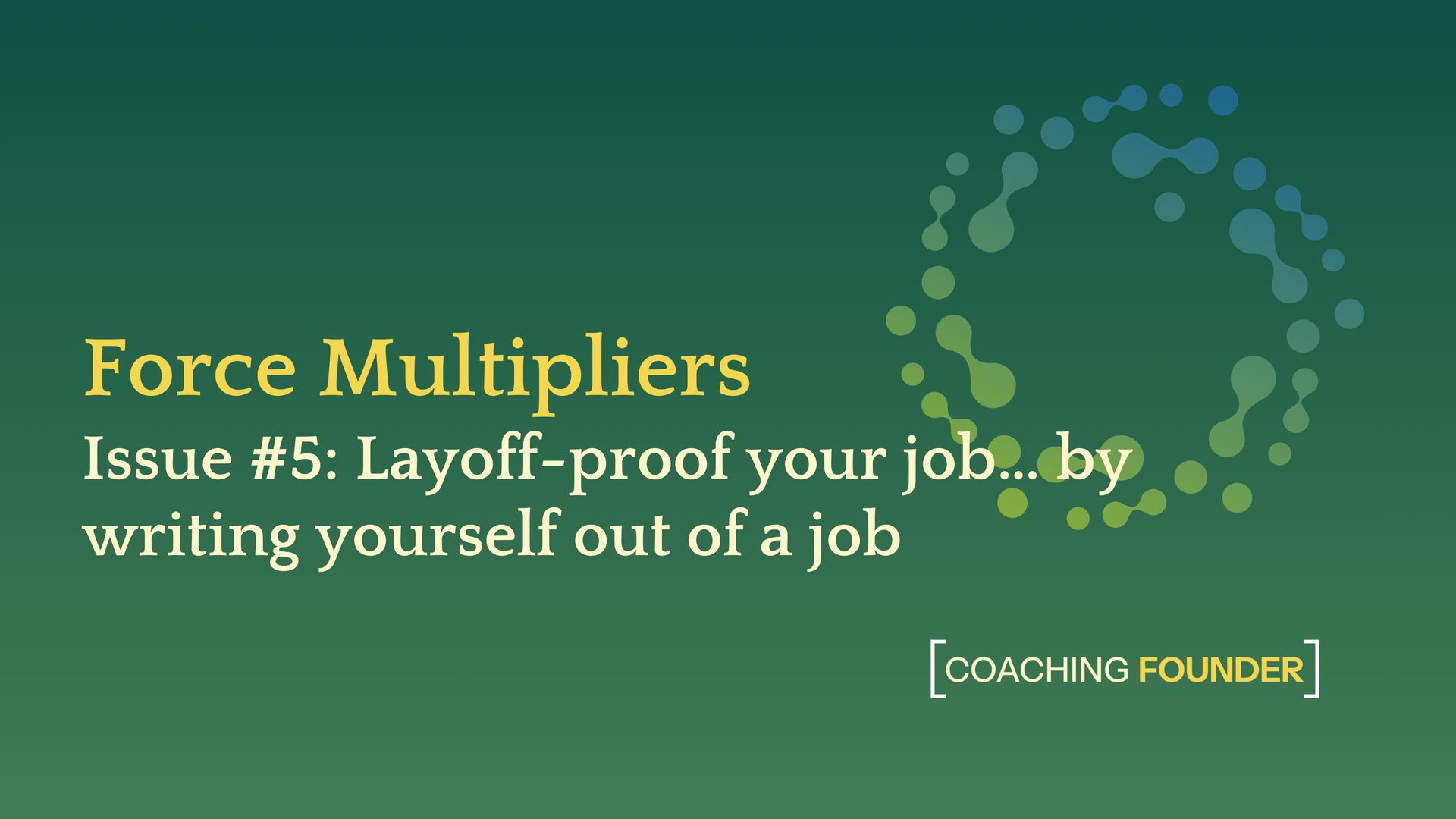- Force Multipliers
- Posts
- When you feel bored as an operator
When you feel bored as an operator
“So...why am I doing the least interesting shit in the company?” - You as an operator, probably
Hi! Welcome to another issue of Force Multipliers, your weekly briefing from Regina Gerbeaux, where Silicon Valley's behind-the-scenes operators get battle-tested frameworks for their toughest challenges, from putting out chaotic fires to managing strong personalities.
There’s that weird feeling you sometimes get when everything is running smoothly, your systems are humming, and you catch yourself thinking:
"Is this it?"
First, a confession: I've been there.
I have felt this at literally every company I’ve ever operated at.
It feels guilty, because you know there’s always more to do.
But then, you feel bored with what you’re doing, despite the stuff there is to do.
You’re stuck in maintenance mode, and nothing feels exciting anymore.
If you ever feel bored as an operator, know you’re not alone. I’m with you.
A few years ago, I was coaching an operator at a very successful company.
On paper, everything looked perfect. The company was hitting milestones, the team was executing, and this operator had built such solid systems that things basically ran themselves.
But here's what they told me: "I feel bored and not challenged. I'm in maintenance mode versus building mode."
Some of the most successful operators I know have wrestled with this exact feeling. And here's what I've learned:
Boredom in an operator role isn't a character flaw. It's often a sign that you've outgrown your current scope, or that you need to realign with work that actually energizes you.
Here are the things most operators get wrong when they feel this way, and what to do instead.
The Playbook on Handling Operator Boredom
Step 1: Figure out if this is actually about the work 💡
Before you do anything else, you need to get honest about what's really happening.
Ask yourself:
Am I operating in my Zone of Genius right now?
Is the work I'm doing actually interesting to me?
Am I learning and growing, or am I just maintaining?
👉 Is it a Trauma Response?
Here's the deeper question most operators miss: Is this boredom, or is this a trauma response?
Boredom: When you're genuinely not excited by your work, even though there's plenty to do. You're just not interested in the tasks at hand.
Trauma response: When you've conditioned yourself to believe that unless you're drowning in work and stressed out, you're not doing a good job or contributing enough value.

I see this constantly with high-performing operators. They've gotten so used to being in constant firefighting mode that when things are actually running well, their nervous system doesn't know what to do.
The story goes something like: "Unless I'm stressed and overwhelmed, I must not be doing enough."
👉 WHAT TO DO INSTEAD: Take a beat. Sit with this feeling for a week or two before making any major moves.
Sometimes what feels like boredom is actually your body learning how to exist in a state where you're not constantly in crisis mode.
Step 2: Don't add random shit to your plate 🚫
This is where most operators screw themselves over.
The second they feel under-stimulated, they start saying yes to everything.
More projects, more responsibilities, more meetings.
Before they know it, they've created a mess for themselves without actually solving the underlying issue.
🙅🏻♀️🙅🏻♀️🙅🏻♀️ Three things NOT to do:
Don't take on work that someone else should be doing (you'll end up doing lower-level work that doesn't free you up for higher-impact stuff)
Don't commit to new projects without considering that things might pick up later (then you'll be overwhelmed when the busy season hits)
Don't add responsibilities just because they're available (ask yourself: "Do I actually want to do this work?")
The operator I mentioned earlier almost fell into this trap.
They had a whole list of things they could take on: more angel investing, deals outside of startups, social media building, thought leadership, going on podcasts… there was SO MUCH SHIT on their list that they could do.
They were all decent options, but none of them were actually exciting to this person.
Step 3: Get strategic about your energy allocation 🎯
Instead of randomly adding more, get intentional about where you want to spend your time.
Map out your ideal week by asking yourself these three questions:
What percentage of your time do you want spent on maintenance vs. building?
What kind of work makes you feel energized vs. drained?
What would you do if you had 20% more capacity?
For the operator I was coaching, we realized they were spending too much time in maintenance mode because the company had shifted focus. The engineering team needed space to build, which meant stepping back from growth initiatives.
Instead of fighting this or filling the space with busy work, we redirected their energy toward:
Learning and skill building (they started going deeper on relevant skills that would help them better communicate with their engineering team)
Relationship building (deeper connections in their industry)
Personal investments (both financial and time with their family and children)
Step 4: Consider the company stage and your stage 📈
Sometimes boredom isn't about the work. It's about timing.
👉 Here are some company stage questions to ask yourself:
Is your company in a natural lull between growth phases?
Are you waiting for something to launch before you can do your best work?
Have the company's needs shifted away from your core strengths?
👉 And here’s what you should ask yourself on the personal front:
Do you have a life outside of work? (Seriously.)
Are you at a point where you want different challenges?
Is this role still aligned with where you want to grow?
The operator I coached realized their company was in a natural transition period. They also realized they hadn’t done a workout in months, spent quality time with their kids, or seen their friends for the usual happy hour get-together.
Fighting this reality would have been counterproductive. Instead, they used their newfound time to work on the stuff above that mattered.
Step 5: Make the boring work matter 💪
Sometimes you can't change what you're doing, but you can change how you're doing it.
If you're stuck in maintenance mode:
Document everything so thoroughly that you could train your replacement tomorrow (see the newsletter edition below on Writing Yourself Out of a Job)
Use this time to build relationships you've been neglecting
Get ahead on planning for the next growth phase
Invest in skills that will make you more valuable when things pick up
If you're feeling disconnected from the impact:
Track metrics that show your influence (even if it's less visible)
Schedule regular check-ins with people your work affects
Connect your daily tasks to the bigger company mission
The goal isn't to make boring work exciting. The goal is to make sure boring work is still moving you forward.
🤩 When Boredom Is Actually a Good Sign
Here's something counterintuitive: sometimes feeling bored means you're doing your job really well.
If you've built systems so solid that they run without you, you've…
trained your team so well that they don't need constant oversight
anticipated problems before they become fires
… pat yourself on the back. That’s masterful - seriously!
The question becomes: what do you want to do with that mastery?
For some operators, this is the signal to level up within their current role.
For others, it's time to consider what's next.
And for some, it's an invitation to finally have a life outside of work.
All of these are valid choices. The key is being intentional about which one (or ones) you pick.
The bottom line is, boredom in an operator role usually means one of three things:
You've outgrown your current scope
You're not operating in your Zone of Genius
You're experiencing the unfamiliar feeling of things actually running well
Before you make any big moves, figure out which one it is. Then get strategic about what you want to do next.
👆️ And remember: not every moment of your career has to be high-stakes and high-stress. Sometimes the most productive thing you can do is learn to be comfortable with things being under control.
Until next time,

And if you’re reading this - you're already ahead.
Because you know where to find the stuff that’s actually good. Like my templates and resources, and this newsletter.
Resources Mentioned 📌
Layoff-proof your job... by writing yourself out of a job | Force Multipliers
Was this newsletter forwarded to you? Are you here for the first time? If so, remember to subscribe below…
Want more operational content?
Check out Coaching Founder for over a dozen free, downloadable Notion templates to use at your company, and tons of write-ups on how to level up your execs, your teams, and yourself.
About Regina Gerbeaux
 | Regina Gerbeaux was the first Chief of Staff to an executive coach who worked with Silicon Valley’s most successful entrepreneurs, including Brian Armstrong (Coinbase), Naval Ravikant (AngelList), Sam Altman (OpenAI / Y Combinator), and Alexandr Wang (Scale). |
Shortly after her role as Chief of Staff, then COO, she opened her own coaching practice, Coaching Founder, and has worked with outrageously talented operators on teams like Delphi AI, dYdX, Astronomer, Fanatics Live, and many more companies backed by funds like Sequoia and Andreessen Horowitz.
Her open-sourced write-ups on Operational Excellence and how to run a scaling company can be found here and her templates can be found here.
She lives in the Pacific Northwest with her husband, daughter, and Formosan Mountain Dog, and can be found frequenting 6:00AM Orangetheory classes or hiking trails nearby.


Reply